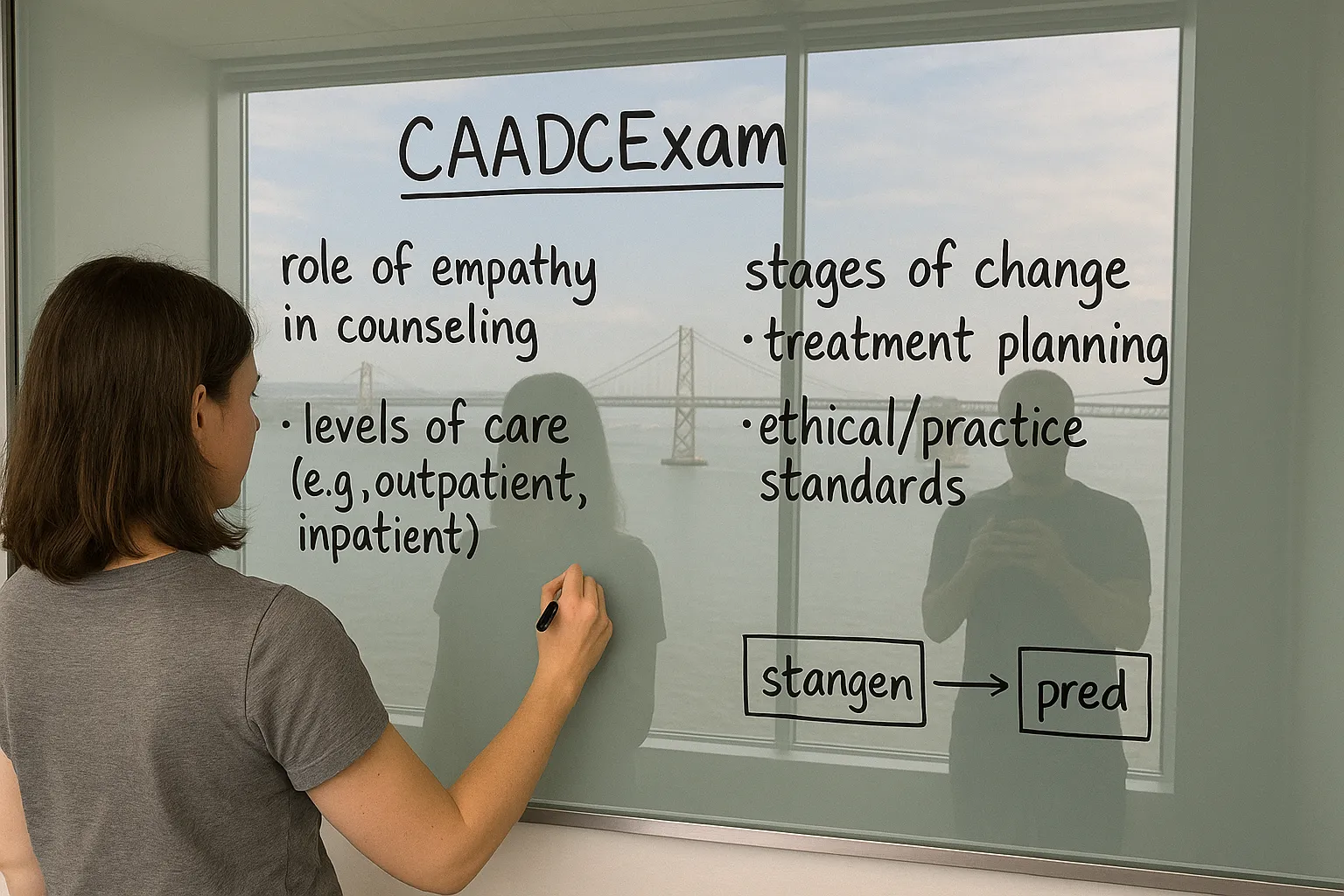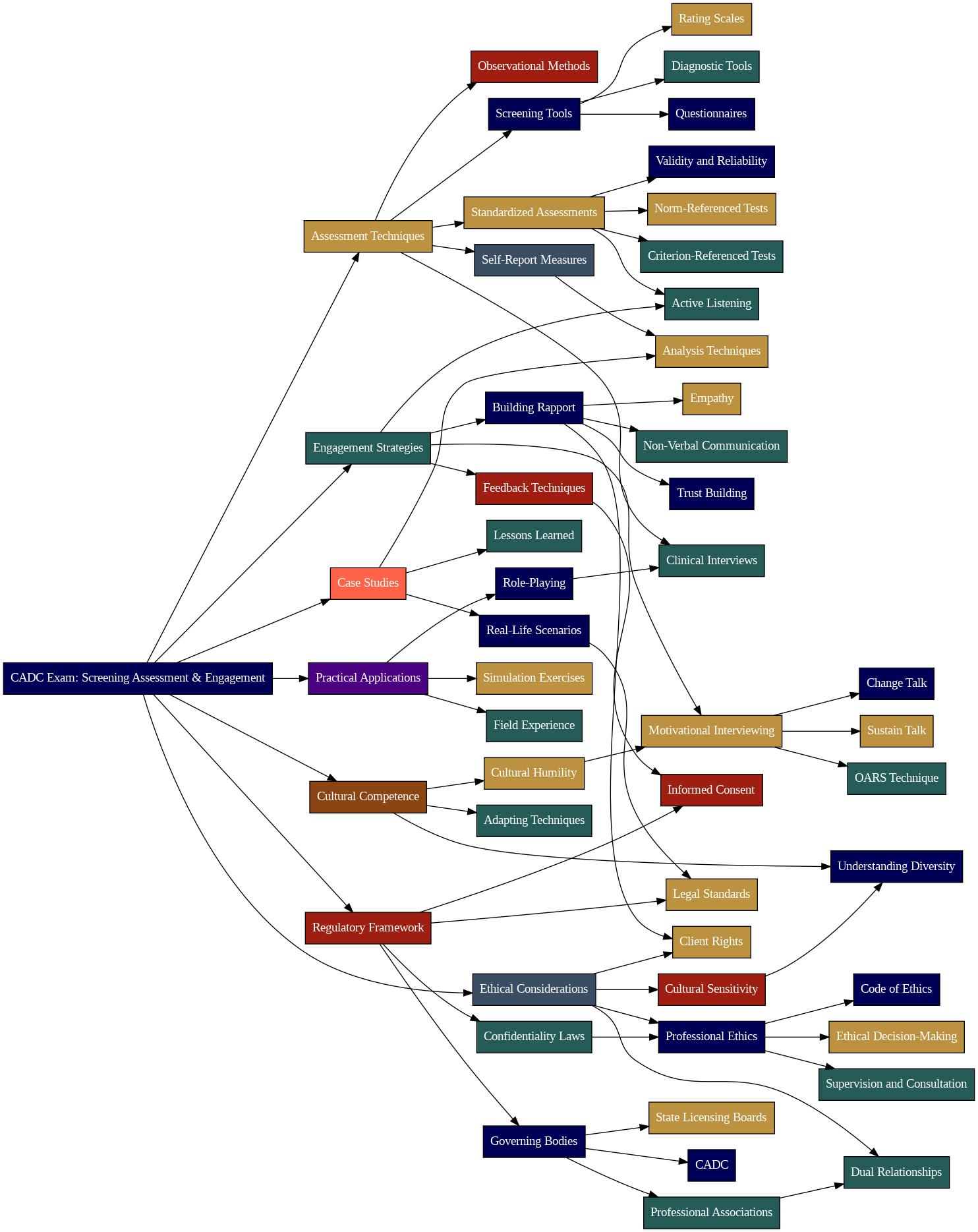Quiz-summary
0 of 30 questions completed
Questions:
- 1
- 2
- 3
- 4
- 5
- 6
- 7
- 8
- 9
- 10
- 11
- 12
- 13
- 14
- 15
- 16
- 17
- 18
- 19
- 20
- 21
- 22
- 23
- 24
- 25
- 26
- 27
- 28
- 29
- 30
Information
Premium Practice Questions
You have already completed the quiz before. Hence you can not start it again.
Quiz is loading...
You must sign in or sign up to start the quiz.
You have to finish following quiz, to start this quiz:
Results
0 of 30 questions answered correctly
Your time:
Time has elapsed
Categories
- Not categorized 0%
- 1
- 2
- 3
- 4
- 5
- 6
- 7
- 8
- 9
- 10
- 11
- 12
- 13
- 14
- 15
- 16
- 17
- 18
- 19
- 20
- 21
- 22
- 23
- 24
- 25
- 26
- 27
- 28
- 29
- 30
- Answered
- Review
-
Question 1 of 30
1. Question
A client, Maria, is receiving substance use counseling from an LADC in Massachusetts. Maria is involved in a custody dispute, and the opposing party’s attorney serves the LADC with a court order demanding the release of Maria’s complete treatment records. Which of the following is the MOST ETHICALLY sound course of action for the LADC?
Correct
In Massachusetts, Licensed Alcohol and Drug Counselors (LADCs) operate under specific regulations regarding client confidentiality, particularly when clients are involved in legal proceedings. While generally, client information is protected under state and federal laws (like HIPAA and 42 CFR Part 2), there are exceptions. One key exception arises when a court order is issued. A valid court order compels the LADC to disclose specific information outlined in the order. However, the LADC has a responsibility to advocate for the client and challenge the order if it’s overly broad or violates the client’s rights. Subpoenas, on the other hand, require the LADC to appear in court or provide documents, but they do not automatically override confidentiality. The LADC should consult with legal counsel before complying with a subpoena to determine the scope of permissible disclosure. Client consent is always a preferred method of disclosure, but it may not be feasible or sufficient in legal contexts. Internal agency policy cannot supersede legal or ethical obligations. The LADC must always prioritize the client’s best interests while adhering to legal requirements. Failing to comply with a valid court order can result in legal consequences for the LADC, but improperly disclosing confidential information can lead to ethical violations and potential harm to the client.
Incorrect
In Massachusetts, Licensed Alcohol and Drug Counselors (LADCs) operate under specific regulations regarding client confidentiality, particularly when clients are involved in legal proceedings. While generally, client information is protected under state and federal laws (like HIPAA and 42 CFR Part 2), there are exceptions. One key exception arises when a court order is issued. A valid court order compels the LADC to disclose specific information outlined in the order. However, the LADC has a responsibility to advocate for the client and challenge the order if it’s overly broad or violates the client’s rights. Subpoenas, on the other hand, require the LADC to appear in court or provide documents, but they do not automatically override confidentiality. The LADC should consult with legal counsel before complying with a subpoena to determine the scope of permissible disclosure. Client consent is always a preferred method of disclosure, but it may not be feasible or sufficient in legal contexts. Internal agency policy cannot supersede legal or ethical obligations. The LADC must always prioritize the client’s best interests while adhering to legal requirements. Failing to comply with a valid court order can result in legal consequences for the LADC, but improperly disclosing confidential information can lead to ethical violations and potential harm to the client.
-
Question 2 of 30
2. Question
Which of the following scenarios presents the MOST significant ethical concern regarding dual relationships for an LADC practicing in Massachusetts?
Correct
In Massachusetts, Licensed Alcohol and Drug Counselors (LADCs) must adhere to specific ethical guidelines regarding professional boundaries and dual relationships. A dual relationship occurs when a counselor has a professional relationship with a client and also has another, significantly different relationship with that same person or someone closely associated with them. These relationships can impair objectivity, competence, and effectiveness in counseling, and they exploit the power imbalance inherent in the therapeutic relationship. While some dual relationships are explicitly prohibited, others require careful consideration and mitigation. Accepting a client’s offer to provide free childcare creates a dual relationship that could compromise the counselor’s objectivity and potentially exploit the client’s vulnerability. The counselor’s judgment may be clouded by the desire to maintain the childcare arrangement, and the client may feel pressured to continue counseling even if it is not beneficial. Other examples of potentially problematic dual relationships include engaging in business ventures with clients, becoming romantically involved with clients, or providing counseling to close friends or family members. It is crucial for LADCs to maintain clear boundaries and avoid situations that could compromise their professional integrity.
Incorrect
In Massachusetts, Licensed Alcohol and Drug Counselors (LADCs) must adhere to specific ethical guidelines regarding professional boundaries and dual relationships. A dual relationship occurs when a counselor has a professional relationship with a client and also has another, significantly different relationship with that same person or someone closely associated with them. These relationships can impair objectivity, competence, and effectiveness in counseling, and they exploit the power imbalance inherent in the therapeutic relationship. While some dual relationships are explicitly prohibited, others require careful consideration and mitigation. Accepting a client’s offer to provide free childcare creates a dual relationship that could compromise the counselor’s objectivity and potentially exploit the client’s vulnerability. The counselor’s judgment may be clouded by the desire to maintain the childcare arrangement, and the client may feel pressured to continue counseling even if it is not beneficial. Other examples of potentially problematic dual relationships include engaging in business ventures with clients, becoming romantically involved with clients, or providing counseling to close friends or family members. It is crucial for LADCs to maintain clear boundaries and avoid situations that could compromise their professional integrity.
-
Question 3 of 30
3. Question
A client, Javier, in a Massachusetts substance use treatment program, discloses to his LADC, that he intends to physically harm his estranged wife when he sees her next. Javier has a history of domestic violence, and the LADC believes Javier poses an imminent threat. Which of the following actions *BEST* reflects the LADC’s ethical and legal obligations in this situation, specific to Massachusetts regulations?
Correct
Massachusetts Licensed Alcohol and Drug Counselors (LADCs) operate within a framework defined by state regulations and ethical guidelines. When faced with a situation where a client presents an imminent risk of harm to a third party, the duty to warn and protect supersedes the general principle of confidentiality. This duty, informed by landmark cases like Tarasoff v. Regents of the University of California, necessitates specific actions. The LADC must assess the credibility and immediacy of the threat. This involves evaluating the client’s history of violence, the specificity of the threat, and the identifiability of the intended victim. If the threat is deemed credible and imminent, the LADC is obligated to take reasonable steps to protect the intended victim. In Massachusetts, this typically involves notifying the intended victim and/or law enforcement. The specific course of action should be guided by the LADC’s clinical judgment, informed by consultation with supervisors or legal counsel, and documented thoroughly. It is crucial to balance the duty to protect with the client’s rights and the potential impact on the therapeutic relationship. Premature or unnecessary disclosure can erode trust and hinder treatment progress. Therefore, the decision to breach confidentiality should be made judiciously, with careful consideration of all relevant factors and in compliance with Massachusetts laws and ethical standards for LADCs. The LADC should also consider the potential need for involuntary commitment proceedings under Massachusetts law if the client poses an immediate danger to themselves or others due to a substance use disorder or co-occurring mental health condition. Consultation with legal counsel is advisable in complex cases.
Incorrect
Massachusetts Licensed Alcohol and Drug Counselors (LADCs) operate within a framework defined by state regulations and ethical guidelines. When faced with a situation where a client presents an imminent risk of harm to a third party, the duty to warn and protect supersedes the general principle of confidentiality. This duty, informed by landmark cases like Tarasoff v. Regents of the University of California, necessitates specific actions. The LADC must assess the credibility and immediacy of the threat. This involves evaluating the client’s history of violence, the specificity of the threat, and the identifiability of the intended victim. If the threat is deemed credible and imminent, the LADC is obligated to take reasonable steps to protect the intended victim. In Massachusetts, this typically involves notifying the intended victim and/or law enforcement. The specific course of action should be guided by the LADC’s clinical judgment, informed by consultation with supervisors or legal counsel, and documented thoroughly. It is crucial to balance the duty to protect with the client’s rights and the potential impact on the therapeutic relationship. Premature or unnecessary disclosure can erode trust and hinder treatment progress. Therefore, the decision to breach confidentiality should be made judiciously, with careful consideration of all relevant factors and in compliance with Massachusetts laws and ethical standards for LADCs. The LADC should also consider the potential need for involuntary commitment proceedings under Massachusetts law if the client poses an immediate danger to themselves or others due to a substance use disorder or co-occurring mental health condition. Consultation with legal counsel is advisable in complex cases.
-
Question 4 of 30
4. Question
A client, Javier, receiving substance use counseling in Boston, Massachusetts, discloses to his LADC, Anya, that he is intensely angry at his former supervisor, whose actions led to Javier’s termination. Javier states, “I’m so angry, I could just explode! That guy deserves to have something really bad happen to him.” Javier has a history of impulsive behavior, but no documented history of violence. The supervisor’s name and workplace are known. Considering the ethical and legal obligations of an LADC in Massachusetts, what is Anya’s *most* appropriate course of action?
Correct
In Massachusetts, LADC’s have a duty to protect clients and the public. This duty is enshrined in both ethical guidelines and legal statutes. When a client presents a serious and imminent risk of harm to a specifically identifiable person, the LADC must take reasonable steps to protect that person. This duty supersedes the usual rules of confidentiality. The “reasonable steps” are not rigidly defined but generally include assessing the threat, warning the intended victim (if identifiable), notifying law enforcement, and/or taking other actions to prevent harm. Failing to act when such a threat is present can lead to legal and ethical repercussions for the LADC, including potential liability for negligence or breach of duty. The key elements are the *imminence* of the threat, the *identifiability* of the victim, and the *seriousness* of the potential harm. General threats or vague feelings of anger, without a specific target, typically do not trigger the duty to warn. Similarly, past threats that are not currently active do not trigger the duty. The LADC must exercise professional judgment, documenting the assessment and actions taken.
Incorrect
In Massachusetts, LADC’s have a duty to protect clients and the public. This duty is enshrined in both ethical guidelines and legal statutes. When a client presents a serious and imminent risk of harm to a specifically identifiable person, the LADC must take reasonable steps to protect that person. This duty supersedes the usual rules of confidentiality. The “reasonable steps” are not rigidly defined but generally include assessing the threat, warning the intended victim (if identifiable), notifying law enforcement, and/or taking other actions to prevent harm. Failing to act when such a threat is present can lead to legal and ethical repercussions for the LADC, including potential liability for negligence or breach of duty. The key elements are the *imminence* of the threat, the *identifiability* of the victim, and the *seriousness* of the potential harm. General threats or vague feelings of anger, without a specific target, typically do not trigger the duty to warn. Similarly, past threats that are not currently active do not trigger the duty. The LADC must exercise professional judgment, documenting the assessment and actions taken.
-
Question 5 of 30
5. Question
A newly licensed LADC in Massachusetts, Javier, is approached by a client, Maria, who presents with symptoms of both opioid use disorder and severe anxiety. Maria requests that Javier provide both substance use counseling and prescribe her medication for her anxiety, as she trusts him. Javier is aware that he is not licensed to prescribe medication. Which of the following courses of action would be MOST ethically appropriate for Javier?
Correct
In Massachusetts, Licensed Alcohol and Drug Counselors (LADCs) have a specific scope of practice defined by state regulations. These regulations outline the permissible activities and responsibilities of an LADC, aiming to protect clients and ensure ethical practice. A core element of this scope involves providing counseling services specifically related to substance use disorders. This includes assessment, treatment planning, individual and group counseling, relapse prevention, and case management, all focused on addressing substance-related issues. LADCs are expected to operate within their defined scope, avoiding practices that fall outside their expertise or legal authorization. Engaging in activities beyond this scope could lead to ethical violations or legal repercussions. The regulations emphasize the importance of cultural competence, requiring LADCs to understand and address the diverse needs of clients from various cultural backgrounds. This includes adapting counseling approaches to align with clients’ cultural values and beliefs, ensuring that treatment is both effective and respectful. Furthermore, Massachusetts LADCs are obligated to adhere to strict confidentiality guidelines, protecting client information and privacy. This includes understanding the nuances of HIPAA regulations and state-specific laws related to confidentiality in substance use treatment. Ethical decision-making models, such as the one that involves identifying the ethical dilemma, considering relevant laws and ethical principles, consulting with supervisors or colleagues, and implementing a course of action that prioritizes client welfare, are essential tools for navigating complex situations.
Incorrect
In Massachusetts, Licensed Alcohol and Drug Counselors (LADCs) have a specific scope of practice defined by state regulations. These regulations outline the permissible activities and responsibilities of an LADC, aiming to protect clients and ensure ethical practice. A core element of this scope involves providing counseling services specifically related to substance use disorders. This includes assessment, treatment planning, individual and group counseling, relapse prevention, and case management, all focused on addressing substance-related issues. LADCs are expected to operate within their defined scope, avoiding practices that fall outside their expertise or legal authorization. Engaging in activities beyond this scope could lead to ethical violations or legal repercussions. The regulations emphasize the importance of cultural competence, requiring LADCs to understand and address the diverse needs of clients from various cultural backgrounds. This includes adapting counseling approaches to align with clients’ cultural values and beliefs, ensuring that treatment is both effective and respectful. Furthermore, Massachusetts LADCs are obligated to adhere to strict confidentiality guidelines, protecting client information and privacy. This includes understanding the nuances of HIPAA regulations and state-specific laws related to confidentiality in substance use treatment. Ethical decision-making models, such as the one that involves identifying the ethical dilemma, considering relevant laws and ethical principles, consulting with supervisors or colleagues, and implementing a course of action that prioritizes client welfare, are essential tools for navigating complex situations.
-
Question 6 of 30
6. Question
A Massachusetts LADC, Kai, is working with a client, Ben, who is struggling with alcohol use disorder. During a session, Ben expresses intense anger towards his supervisor at work, stating, “I’m so angry I could hurt him.” Ben has never acted violently before, but has previously described feeling unfairly treated by his supervisor. According to Massachusetts ethical guidelines and legal mandates, what is Kai’s MOST appropriate course of action?
Correct
In Massachusetts, Licensed Alcohol and Drug Counselors (LADCs) operate under specific ethical guidelines and legal mandates, particularly concerning client confidentiality and duty to warn. MGL c. 111, § 70E outlines patient rights, including confidentiality, but this right is not absolute. The “duty to warn” doctrine, stemming from the Tarasoff case and adapted in Massachusetts law, necessitates that therapists take reasonable precautions to protect identifiable third parties from serious threats of physical violence made by their clients. This duty is triggered when a client presents a clear and imminent danger to a specific individual or group. The counselor must assess the credibility and seriousness of the threat, considering factors such as the client’s history of violence, access to means, and the specificity of the threat. Reasonable precautions can include notifying the potential victim, contacting law enforcement, or initiating commitment proceedings. Failing to act appropriately when a duty to warn exists can result in legal liability for the counselor. The counselor’s actions must be documented carefully, detailing the assessment of the threat, the steps taken to protect the potential victim, and the rationale behind those actions. Consultation with supervisors and legal counsel is advisable in complex cases. It’s also important to note that even when breaching confidentiality, the counselor must strive to disclose only the minimum necessary information to avert the danger.
Incorrect
In Massachusetts, Licensed Alcohol and Drug Counselors (LADCs) operate under specific ethical guidelines and legal mandates, particularly concerning client confidentiality and duty to warn. MGL c. 111, § 70E outlines patient rights, including confidentiality, but this right is not absolute. The “duty to warn” doctrine, stemming from the Tarasoff case and adapted in Massachusetts law, necessitates that therapists take reasonable precautions to protect identifiable third parties from serious threats of physical violence made by their clients. This duty is triggered when a client presents a clear and imminent danger to a specific individual or group. The counselor must assess the credibility and seriousness of the threat, considering factors such as the client’s history of violence, access to means, and the specificity of the threat. Reasonable precautions can include notifying the potential victim, contacting law enforcement, or initiating commitment proceedings. Failing to act appropriately when a duty to warn exists can result in legal liability for the counselor. The counselor’s actions must be documented carefully, detailing the assessment of the threat, the steps taken to protect the potential victim, and the rationale behind those actions. Consultation with supervisors and legal counsel is advisable in complex cases. It’s also important to note that even when breaching confidentiality, the counselor must strive to disclose only the minimum necessary information to avert the danger.
-
Question 7 of 30
7. Question
An LADC in Massachusetts, working with a client named Javier who is struggling with opioid addiction, learns that Javier’s 8-year-old child has unexplained bruises and Javier seems increasingly agitated when discussing his home life. Javier denies any abuse, attributing the bruises to “rough play.” The LADC has a growing suspicion but lacks concrete evidence. According to Massachusetts law and ethical guidelines, what is the MOST appropriate course of action for the LADC?
Correct
In Massachusetts, Licensed Alcohol and Drug Counselors (LADCs) have a responsibility to report suspected child abuse or neglect under M.G.L. c. 119, § 51A. This duty is paramount and supersedes confidentiality concerns in situations where there is reasonable cause to believe that a child is suffering from abuse or neglect. The “reasonable cause to believe” standard is lower than “certainty” or “proof”; it requires a good faith belief based on objective facts that abuse or neglect may be occurring. Failure to report can result in legal consequences for the LADC. The LADC should make the report immediately to the Department of Children and Families (DCF). Documenting the report is crucial for legal and ethical protection. Consulting with a supervisor or legal counsel is advisable to ensure proper adherence to reporting procedures and ethical guidelines. The LADC should also be prepared to provide any relevant information to DCF during their investigation. The LADC’s primary responsibility is to protect the child, even if it means breaking confidentiality.
Incorrect
In Massachusetts, Licensed Alcohol and Drug Counselors (LADCs) have a responsibility to report suspected child abuse or neglect under M.G.L. c. 119, § 51A. This duty is paramount and supersedes confidentiality concerns in situations where there is reasonable cause to believe that a child is suffering from abuse or neglect. The “reasonable cause to believe” standard is lower than “certainty” or “proof”; it requires a good faith belief based on objective facts that abuse or neglect may be occurring. Failure to report can result in legal consequences for the LADC. The LADC should make the report immediately to the Department of Children and Families (DCF). Documenting the report is crucial for legal and ethical protection. Consulting with a supervisor or legal counsel is advisable to ensure proper adherence to reporting procedures and ethical guidelines. The LADC should also be prepared to provide any relevant information to DCF during their investigation. The LADC’s primary responsibility is to protect the child, even if it means breaking confidentiality.
-
Question 8 of 30
8. Question
A Massachusetts LADC, Aaliyah, is working with a client, Ben, who discloses a detailed plan to inflict serious harm on his former supervisor, whom he names specifically. Ben has a history of violent behavior and possesses the means to carry out his plan. Aaliyah informs Ben that she cannot keep this information confidential, but takes no further action. Which of the following best describes whether Aaliyah has met her legal and ethical obligations in this situation?
Correct
In Massachusetts, an LADC’s duty to protect arises when a client presents a serious and imminent risk of harm to a reasonably identifiable victim. This duty, stemming from the Tarasoff case and subsequent interpretations, requires the counselor to take reasonable steps to protect the intended victim. Simply informing the client of the potential consequences of their actions is generally insufficient to meet this duty. While consulting with supervisors and documenting actions are essential components of ethical practice, they are not, in themselves, sufficient to discharge the duty to protect. The primary obligation is to prevent the harm from occurring, which may necessitate warning the intended victim or notifying law enforcement, depending on the specifics of the situation and applicable Massachusetts laws and regulations. The LADC must carefully weigh the client’s confidentiality against the potential for harm, prioritizing the safety of the potential victim. The counselor’s actions must be guided by professional ethical standards, legal requirements, and a thorough risk assessment. Failure to act appropriately could result in legal liability and ethical sanctions. This decision-making process should be meticulously documented to demonstrate the counselor’s reasonable and ethical response to the situation.
Incorrect
In Massachusetts, an LADC’s duty to protect arises when a client presents a serious and imminent risk of harm to a reasonably identifiable victim. This duty, stemming from the Tarasoff case and subsequent interpretations, requires the counselor to take reasonable steps to protect the intended victim. Simply informing the client of the potential consequences of their actions is generally insufficient to meet this duty. While consulting with supervisors and documenting actions are essential components of ethical practice, they are not, in themselves, sufficient to discharge the duty to protect. The primary obligation is to prevent the harm from occurring, which may necessitate warning the intended victim or notifying law enforcement, depending on the specifics of the situation and applicable Massachusetts laws and regulations. The LADC must carefully weigh the client’s confidentiality against the potential for harm, prioritizing the safety of the potential victim. The counselor’s actions must be guided by professional ethical standards, legal requirements, and a thorough risk assessment. Failure to act appropriately could result in legal liability and ethical sanctions. This decision-making process should be meticulously documented to demonstrate the counselor’s reasonable and ethical response to the situation.
-
Question 9 of 30
9. Question
A client, Javier, discloses to his LADC in Massachusetts that his neighbor, who frequently babysits Javier’s 6-year-old child, often appears intoxicated while supervising the child. Javier states he hasn’t directly witnessed any harm to his child but is increasingly concerned about the neighbor’s behavior and potential neglect. According to Massachusetts law and ethical guidelines for LADCs, what is the MOST appropriate course of action for the counselor?
Correct
In Massachusetts, Licensed Alcohol and Drug Counselors (LADCs) are mandated reporters, meaning they are legally obligated to report suspected instances of child abuse or neglect. This duty supersedes client confidentiality. The specific law governing this is M.G.L. c. 119, § 51A. This statute outlines the requirements for reporting reasonable cause to believe a child is suffering from abuse or neglect. Failing to report when there is reasonable cause can result in legal penalties for the LADC. When an LADC receives information from a client indicating potential harm to a child, they must prioritize the child’s safety and well-being above the client’s right to confidentiality. The counselor must follow the mandated reporting procedures outlined in Massachusetts law, which typically involve contacting the Department of Children and Families (DCF). It is crucial for the LADC to document the information received, the steps taken to assess the situation, and the report made to DCF. This documentation serves as evidence of compliance with the mandated reporting law and protects the counselor from potential liability. The ethical guidelines for LADCs in Massachusetts also reinforce the importance of adhering to legal requirements, including mandated reporting. LADCs are expected to be knowledgeable about and comply with all applicable laws and regulations related to their practice.
Incorrect
In Massachusetts, Licensed Alcohol and Drug Counselors (LADCs) are mandated reporters, meaning they are legally obligated to report suspected instances of child abuse or neglect. This duty supersedes client confidentiality. The specific law governing this is M.G.L. c. 119, § 51A. This statute outlines the requirements for reporting reasonable cause to believe a child is suffering from abuse or neglect. Failing to report when there is reasonable cause can result in legal penalties for the LADC. When an LADC receives information from a client indicating potential harm to a child, they must prioritize the child’s safety and well-being above the client’s right to confidentiality. The counselor must follow the mandated reporting procedures outlined in Massachusetts law, which typically involve contacting the Department of Children and Families (DCF). It is crucial for the LADC to document the information received, the steps taken to assess the situation, and the report made to DCF. This documentation serves as evidence of compliance with the mandated reporting law and protects the counselor from potential liability. The ethical guidelines for LADCs in Massachusetts also reinforce the importance of adhering to legal requirements, including mandated reporting. LADCs are expected to be knowledgeable about and comply with all applicable laws and regulations related to their practice.
-
Question 10 of 30
10. Question
An LADC in Massachusetts, Jamila, is working with a client, Ben, who is struggling with opioid use disorder. During a session, Ben discloses that his eight-year-old daughter, Lily, has been left home alone for extended periods while he is using substances. Ben states he leaves her with access to food but acknowledges her safety is compromised. Ben begs Jamila not to report this, citing fear of losing custody. What is Jamila’s ethical and legal obligation in this situation?
Correct
In Massachusetts, Licensed Alcohol and Drug Counselors (LADCs) are mandated reporters. This means they are legally obligated to report suspected instances of child abuse or neglect to the Department of Children and Families (DCF). The legal threshold for reporting is reasonable cause to believe that a child is suffering from abuse or neglect. This obligation supersedes general confidentiality rules. Even if the information was disclosed during a counseling session and is generally considered confidential, the LADC must report it if they have reasonable cause to believe a child is at risk. Failure to report suspected child abuse or neglect can result in legal penalties for the LADC. The LADC’s primary responsibility is to protect the safety and well-being of children, and the mandatory reporting law is designed to ensure that children receive the necessary protection and intervention. The LADC should document the information that led to the suspicion and the steps taken to report it.
Incorrect
In Massachusetts, Licensed Alcohol and Drug Counselors (LADCs) are mandated reporters. This means they are legally obligated to report suspected instances of child abuse or neglect to the Department of Children and Families (DCF). The legal threshold for reporting is reasonable cause to believe that a child is suffering from abuse or neglect. This obligation supersedes general confidentiality rules. Even if the information was disclosed during a counseling session and is generally considered confidential, the LADC must report it if they have reasonable cause to believe a child is at risk. Failure to report suspected child abuse or neglect can result in legal penalties for the LADC. The LADC’s primary responsibility is to protect the safety and well-being of children, and the mandatory reporting law is designed to ensure that children receive the necessary protection and intervention. The LADC should document the information that led to the suspicion and the steps taken to report it.
-
Question 11 of 30
11. Question
A Massachusetts LADC is using Motivational Interviewing (MI) techniques with a client, Sarah, who is ambivalent about entering a residential treatment program for her alcohol use disorder. Sarah states, “I know I need help, but I just don’t think I can leave my job and my family for a month.” Which of the following responses by the LADC BEST exemplifies the principle of “rolling with resistance” in MI?
Correct
Motivational Interviewing (MI) is a client-centered, directive method for enhancing intrinsic motivation to change by exploring and resolving ambivalence. A core principle of MI is expressing empathy, which involves understanding and reflecting the client’s perspective without judgment. Developing discrepancy is another key element, helping clients recognize the difference between their current behavior and their desired goals or values. Rolling with resistance means avoiding direct confrontation and instead acknowledging the client’s resistance as a natural part of the change process. Supporting self-efficacy involves fostering the client’s belief in their ability to make positive changes. Central to MI is evoking the client’s own reasons for change, rather than imposing external motivations. Open-ended questions, affirmations, reflective listening, and summaries (OARS) are fundamental techniques used in MI to facilitate the change process. MI is particularly effective in addressing ambivalence about substance use and promoting engagement in treatment. The spirit of MI emphasizes collaboration, acceptance, compassion, and evocation.
Incorrect
Motivational Interviewing (MI) is a client-centered, directive method for enhancing intrinsic motivation to change by exploring and resolving ambivalence. A core principle of MI is expressing empathy, which involves understanding and reflecting the client’s perspective without judgment. Developing discrepancy is another key element, helping clients recognize the difference between their current behavior and their desired goals or values. Rolling with resistance means avoiding direct confrontation and instead acknowledging the client’s resistance as a natural part of the change process. Supporting self-efficacy involves fostering the client’s belief in their ability to make positive changes. Central to MI is evoking the client’s own reasons for change, rather than imposing external motivations. Open-ended questions, affirmations, reflective listening, and summaries (OARS) are fundamental techniques used in MI to facilitate the change process. MI is particularly effective in addressing ambivalence about substance use and promoting engagement in treatment. The spirit of MI emphasizes collaboration, acceptance, compassion, and evocation.
-
Question 12 of 30
12. Question
A client, during an initial counseling session with a Massachusetts LADC, discloses they were sexually abused as a child by a now-deceased relative. The client is now 45 years old and reports no current abuse or threat to any child. According to Massachusetts law regarding mandatory reporting, what is the LADC’s *primary* legal obligation in this situation?
Correct
In Massachusetts, Licensed Alcohol and Drug Counselors (LADCs) are mandated reporters under specific circumstances, primarily when there is reasonable cause to believe a child is suffering from abuse or neglect. This duty to report is enshrined in Massachusetts General Laws Chapter 119, Section 51A. However, the duty to report does not extend to situations involving solely past abuse, unless there is a current and ongoing risk to a child. A client disclosing a history of past abuse, without any indication of current harm to a child, does not trigger the mandatory reporting requirement. While LADCs must always prioritize the safety and well-being of children, they must also be mindful of client confidentiality and the specific legal obligations outlined in Massachusetts law. In this scenario, the client’s disclosure pertains to past abuse, and there is no indication of ongoing harm to a child. Therefore, the LADC is not legally obligated to file a 51A report. The counselor should, however, explore the client’s trauma history, offer support, and provide referrals for trauma-informed care. Furthermore, the counselor should document the disclosure and the rationale for not filing a report.
Incorrect
In Massachusetts, Licensed Alcohol and Drug Counselors (LADCs) are mandated reporters under specific circumstances, primarily when there is reasonable cause to believe a child is suffering from abuse or neglect. This duty to report is enshrined in Massachusetts General Laws Chapter 119, Section 51A. However, the duty to report does not extend to situations involving solely past abuse, unless there is a current and ongoing risk to a child. A client disclosing a history of past abuse, without any indication of current harm to a child, does not trigger the mandatory reporting requirement. While LADCs must always prioritize the safety and well-being of children, they must also be mindful of client confidentiality and the specific legal obligations outlined in Massachusetts law. In this scenario, the client’s disclosure pertains to past abuse, and there is no indication of ongoing harm to a child. Therefore, the LADC is not legally obligated to file a 51A report. The counselor should, however, explore the client’s trauma history, offer support, and provide referrals for trauma-informed care. Furthermore, the counselor should document the disclosure and the rationale for not filing a report.
-
Question 13 of 30
13. Question
A Massachusetts LADC, Javier, receives a court order demanding the release of a client’s complete treatment records in a pending child custody case. Javier knows the records contain sensitive information not directly relevant to the custody dispute. What is Javier’s MOST appropriate course of action?
Correct
In Massachusetts, Licensed Alcohol and Drug Counselors (LADCs) operate under specific ethical guidelines and legal requirements concerning client confidentiality, particularly when clients are involved in legal proceedings. While the general principle of confidentiality protects client information, exceptions exist when a court order is issued. A court order compels the LADC to disclose specific information relevant to the legal case. However, even with a court order, the LADC has a responsibility to advocate for the client’s confidentiality to the extent legally permissible. This involves consulting with legal counsel, informing the client about the court order and its implications, and attempting to negotiate the scope of the disclosure to protect sensitive information not directly relevant to the legal proceedings. The LADC must also be aware of the interplay between state and federal regulations, such as 42 CFR Part 2, which governs the confidentiality of substance use disorder patient records. The LADC should only disclose the minimum necessary information required by the court order, ensuring compliance with both legal obligations and ethical responsibilities to the client. Failing to properly navigate this situation could lead to legal repercussions for the LADC or harm to the client’s treatment progress and trust in the therapeutic relationship. LADCs should maintain detailed documentation of all interactions and decisions made regarding the disclosure of confidential information in response to a court order.
Incorrect
In Massachusetts, Licensed Alcohol and Drug Counselors (LADCs) operate under specific ethical guidelines and legal requirements concerning client confidentiality, particularly when clients are involved in legal proceedings. While the general principle of confidentiality protects client information, exceptions exist when a court order is issued. A court order compels the LADC to disclose specific information relevant to the legal case. However, even with a court order, the LADC has a responsibility to advocate for the client’s confidentiality to the extent legally permissible. This involves consulting with legal counsel, informing the client about the court order and its implications, and attempting to negotiate the scope of the disclosure to protect sensitive information not directly relevant to the legal proceedings. The LADC must also be aware of the interplay between state and federal regulations, such as 42 CFR Part 2, which governs the confidentiality of substance use disorder patient records. The LADC should only disclose the minimum necessary information required by the court order, ensuring compliance with both legal obligations and ethical responsibilities to the client. Failing to properly navigate this situation could lead to legal repercussions for the LADC or harm to the client’s treatment progress and trust in the therapeutic relationship. LADCs should maintain detailed documentation of all interactions and decisions made regarding the disclosure of confidential information in response to a court order.
-
Question 14 of 30
14. Question
Aisha, a client in recovery in Massachusetts, discloses to her LADC that she has relapsed and is currently using intravenous drugs. She does not express any intent to harm herself or others, but she is the primary caregiver for her 8-year-old child. Which of the following actions should the LADC prioritize, considering Massachusetts laws and ethical guidelines?
Correct
In Massachusetts, Licensed Alcohol and Drug Counselors (LADCs) operate under specific regulations concerning client confidentiality, particularly when it comes to mandated reporting. While the general principle is to maintain client confidentiality, exceptions exist when there is a legal obligation to report certain situations to protect the client or others. The scenario involves a client, Aisha, who is in recovery and discloses a relapse and current intravenous drug use. This situation triggers several considerations under Massachusetts law. Firstly, the LADC must assess whether Aisha’s drug use poses an immediate risk of harm to herself or others. If Aisha expresses suicidal ideation or an intent to harm someone else, the duty to warn and protect becomes paramount, potentially overriding confidentiality. However, the mere admission of relapse and current drug use, without explicit threats or indication of harm, does not automatically trigger this duty. Secondly, Massachusetts has mandatory reporting laws related to child abuse or neglect. If Aisha discloses that she is using drugs while being a primary caregiver to a minor, this could constitute neglect, triggering the LADC’s obligation to report to the Department of Children and Families (DCF). The key factor is whether Aisha’s substance use is directly impacting her ability to provide adequate care and supervision for the child, placing the child at risk of harm. Thirdly, the LADC must consider Aisha’s informed consent regarding the limits of confidentiality. At the outset of treatment, Aisha should have been informed about the circumstances under which confidentiality may be breached, including mandated reporting requirements. This information allows Aisha to make informed decisions about what she discloses during counseling. In this scenario, the most ethically and legally sound course of action is for the LADC to engage in a thorough assessment of Aisha’s current situation. This includes evaluating the severity of her relapse, her risk of harm to herself or others, and the potential impact on any children in her care. The LADC should also remind Aisha of the limits of confidentiality and discuss the potential consequences of her disclosures. If, after this assessment, the LADC determines that Aisha poses an imminent threat to herself or others, or that her substance use constitutes child neglect, then mandated reporting is necessary. However, absent these specific circumstances, maintaining Aisha’s confidentiality is crucial for fostering trust and promoting her continued engagement in treatment. The LADC should also explore with Aisha the possibility of voluntarily disclosing information to relevant parties, such as family members or healthcare providers, to enhance her support system and promote her recovery.
Incorrect
In Massachusetts, Licensed Alcohol and Drug Counselors (LADCs) operate under specific regulations concerning client confidentiality, particularly when it comes to mandated reporting. While the general principle is to maintain client confidentiality, exceptions exist when there is a legal obligation to report certain situations to protect the client or others. The scenario involves a client, Aisha, who is in recovery and discloses a relapse and current intravenous drug use. This situation triggers several considerations under Massachusetts law. Firstly, the LADC must assess whether Aisha’s drug use poses an immediate risk of harm to herself or others. If Aisha expresses suicidal ideation or an intent to harm someone else, the duty to warn and protect becomes paramount, potentially overriding confidentiality. However, the mere admission of relapse and current drug use, without explicit threats or indication of harm, does not automatically trigger this duty. Secondly, Massachusetts has mandatory reporting laws related to child abuse or neglect. If Aisha discloses that she is using drugs while being a primary caregiver to a minor, this could constitute neglect, triggering the LADC’s obligation to report to the Department of Children and Families (DCF). The key factor is whether Aisha’s substance use is directly impacting her ability to provide adequate care and supervision for the child, placing the child at risk of harm. Thirdly, the LADC must consider Aisha’s informed consent regarding the limits of confidentiality. At the outset of treatment, Aisha should have been informed about the circumstances under which confidentiality may be breached, including mandated reporting requirements. This information allows Aisha to make informed decisions about what she discloses during counseling. In this scenario, the most ethically and legally sound course of action is for the LADC to engage in a thorough assessment of Aisha’s current situation. This includes evaluating the severity of her relapse, her risk of harm to herself or others, and the potential impact on any children in her care. The LADC should also remind Aisha of the limits of confidentiality and discuss the potential consequences of her disclosures. If, after this assessment, the LADC determines that Aisha poses an imminent threat to herself or others, or that her substance use constitutes child neglect, then mandated reporting is necessary. However, absent these specific circumstances, maintaining Aisha’s confidentiality is crucial for fostering trust and promoting her continued engagement in treatment. The LADC should also explore with Aisha the possibility of voluntarily disclosing information to relevant parties, such as family members or healthcare providers, to enhance her support system and promote her recovery.
-
Question 15 of 30
15. Question
A client, Javier, in a Massachusetts substance use treatment program, expresses anger towards his former employer, stating, “They ruined my life, and I’m going to make them pay.” He does not specify how he intends to “make them pay” and has no history of violence. According to Massachusetts law and ethical guidelines for LADCs, what is the MOST appropriate course of action?
Correct
In Massachusetts, an LADC’s duty to warn and protect arises when a client presents a serious and imminent threat of physical violence to a reasonably identifiable victim or victims. This duty, stemming from the *Tarasoff* case and subsequent interpretations, is not absolute and requires careful consideration. The counselor must assess the credibility and immediacy of the threat. Consultation with supervisors and legal counsel is crucial in navigating this complex ethical and legal terrain. The duty is triggered when the client’s statements or behaviors indicate a clear intention and plan to harm a specific individual or group. General feelings of anger or frustration, without a specific target, do not typically trigger the duty to warn. The *Tarasoff* principle seeks to balance client confidentiality with the safety of potential victims. The counselor must act reasonably to protect the intended victim, which may involve notifying the potential victim, law enforcement, or taking other steps to prevent the threatened harm. Failure to act appropriately can result in legal liability for the counselor. This responsibility is outlined in Massachusetts regulations governing licensed alcohol and drug counselors, specifically addressing client welfare and safety.
Incorrect
In Massachusetts, an LADC’s duty to warn and protect arises when a client presents a serious and imminent threat of physical violence to a reasonably identifiable victim or victims. This duty, stemming from the *Tarasoff* case and subsequent interpretations, is not absolute and requires careful consideration. The counselor must assess the credibility and immediacy of the threat. Consultation with supervisors and legal counsel is crucial in navigating this complex ethical and legal terrain. The duty is triggered when the client’s statements or behaviors indicate a clear intention and plan to harm a specific individual or group. General feelings of anger or frustration, without a specific target, do not typically trigger the duty to warn. The *Tarasoff* principle seeks to balance client confidentiality with the safety of potential victims. The counselor must act reasonably to protect the intended victim, which may involve notifying the potential victim, law enforcement, or taking other steps to prevent the threatened harm. Failure to act appropriately can result in legal liability for the counselor. This responsibility is outlined in Massachusetts regulations governing licensed alcohol and drug counselors, specifically addressing client welfare and safety.
-
Question 16 of 30
16. Question
During a counseling session in Massachusetts, a client discloses that they have been neglecting their child’s basic needs due to their ongoing substance use. The client states, “I know it’s wrong, but I just can’t seem to get my act together. My kid is often left alone.” What is the LADC’s MOST appropriate course of action?
Correct
The correct answer is to prioritize the client’s safety and well-being by contacting emergency services and initiating a 51A report if child abuse or neglect is suspected. In Massachusetts, licensed professionals are mandated reporters, meaning they are legally obligated to report any reasonable suspicion of child abuse or neglect to the Department of Children and Families (DCF). While maintaining client confidentiality is important, it is superseded by the duty to protect vulnerable individuals, particularly children. Ignoring the client’s statement or simply encouraging them to seek help minimizes the potential risk to the child. Attempting to address the situation solely through therapeutic interventions without involving the appropriate authorities could jeopardize the child’s safety and expose the LADC to legal liability. The primary ethical and legal responsibility is to ensure the child’s safety by reporting the suspected abuse or neglect to the relevant authorities.
Incorrect
The correct answer is to prioritize the client’s safety and well-being by contacting emergency services and initiating a 51A report if child abuse or neglect is suspected. In Massachusetts, licensed professionals are mandated reporters, meaning they are legally obligated to report any reasonable suspicion of child abuse or neglect to the Department of Children and Families (DCF). While maintaining client confidentiality is important, it is superseded by the duty to protect vulnerable individuals, particularly children. Ignoring the client’s statement or simply encouraging them to seek help minimizes the potential risk to the child. Attempting to address the situation solely through therapeutic interventions without involving the appropriate authorities could jeopardize the child’s safety and expose the LADC to legal liability. The primary ethical and legal responsibility is to ensure the child’s safety by reporting the suspected abuse or neglect to the relevant authorities.
-
Question 17 of 30
17. Question
Jamal, a Massachusetts LADC, discovers that one of his clients, Anya, is the lead singer in a local band. Anya asks Jamal to play bass guitar in her band, as they are short a member. According to Massachusetts ethical guidelines for LADCs, what is Jamal’s MOST appropriate course of action?
Correct
In Massachusetts, Licensed Alcohol and Drug Counselors (LADCs) operate under specific ethical guidelines regarding dual relationships. A dual relationship occurs when a counselor has a professional relationship with a client and simultaneously has another relationship with the same person. The Massachusetts Board of Registration of Allied Mental Health and Human Services Professions provides guidance on these matters. These regulations prioritize client welfare and aim to prevent exploitation or harm that can arise from conflicts of interest. According to these guidelines, engaging in a dual relationship is generally prohibited if it impairs the counselor’s objectivity, competence, or effectiveness in performing their professional functions, or if it risks exploiting or harming the client. Factors to consider include the power differential between counselor and client, the potential for impaired judgment, and the nature of the secondary relationship. In the scenario presented, the counselor’s involvement in the client’s band introduces a dual relationship. While seemingly innocuous, this situation creates potential for conflicts of interest. The counselor’s objectivity could be compromised if the band’s activities or the client’s behavior within the band trigger countertransference or otherwise affect the counselor’s professional judgment. The power dynamic inherent in the therapeutic relationship could be exploited if the counselor uses their position to influence the band’s decisions or the client’s role within it. The client may feel pressured to act in ways that please the counselor in both therapeutic and band contexts, blurring professional boundaries. Therefore, the counselor must carefully evaluate the potential risks and benefits of participating in the client’s band. If the risks outweigh the benefits, or if the counselor cannot mitigate the potential for harm, they should decline to participate. If participation is deemed appropriate, the counselor must obtain informed consent from the client, documenting the potential risks and benefits and establishing clear boundaries for both relationships. Ongoing monitoring and consultation with colleagues are also essential to ensure the dual relationship remains ethical and does not compromise the client’s well-being. The most ethical course of action is to prioritize the client’s welfare and avoid situations that could lead to exploitation or harm.
Incorrect
In Massachusetts, Licensed Alcohol and Drug Counselors (LADCs) operate under specific ethical guidelines regarding dual relationships. A dual relationship occurs when a counselor has a professional relationship with a client and simultaneously has another relationship with the same person. The Massachusetts Board of Registration of Allied Mental Health and Human Services Professions provides guidance on these matters. These regulations prioritize client welfare and aim to prevent exploitation or harm that can arise from conflicts of interest. According to these guidelines, engaging in a dual relationship is generally prohibited if it impairs the counselor’s objectivity, competence, or effectiveness in performing their professional functions, or if it risks exploiting or harming the client. Factors to consider include the power differential between counselor and client, the potential for impaired judgment, and the nature of the secondary relationship. In the scenario presented, the counselor’s involvement in the client’s band introduces a dual relationship. While seemingly innocuous, this situation creates potential for conflicts of interest. The counselor’s objectivity could be compromised if the band’s activities or the client’s behavior within the band trigger countertransference or otherwise affect the counselor’s professional judgment. The power dynamic inherent in the therapeutic relationship could be exploited if the counselor uses their position to influence the band’s decisions or the client’s role within it. The client may feel pressured to act in ways that please the counselor in both therapeutic and band contexts, blurring professional boundaries. Therefore, the counselor must carefully evaluate the potential risks and benefits of participating in the client’s band. If the risks outweigh the benefits, or if the counselor cannot mitigate the potential for harm, they should decline to participate. If participation is deemed appropriate, the counselor must obtain informed consent from the client, documenting the potential risks and benefits and establishing clear boundaries for both relationships. Ongoing monitoring and consultation with colleagues are also essential to ensure the dual relationship remains ethical and does not compromise the client’s well-being. The most ethical course of action is to prioritize the client’s welfare and avoid situations that could lead to exploitation or harm.
-
Question 18 of 30
18. Question
Jamal, a client in your Massachusetts-based substance use disorder treatment program, discloses that while actively using substances, he often leaves his two young children, ages 4 and 6, alone at home for “short periods” because he “needs to get things done.” He assures you they are “fine” and “self-sufficient.” Considering your ethical and legal obligations as a Licensed Alcohol and Drug Counselor (LADC) in Massachusetts, what is the MOST appropriate course of action?
Correct
In Massachusetts, LADC’s are mandated reporters under specific circumstances detailed in M.G.L. c. 119, § 51A. This law requires reporting suspected child abuse or neglect when there is “reasonable cause to believe” that a child is suffering from abuse or neglect. “Reasonable cause to believe” doesn’t necessitate absolute certainty but rather a level of suspicion based on objective facts that would lead a prudent person to conclude abuse or neglect has occurred. The law provides immunity from liability for reporters acting in good faith. The question probes the application of this mandatory reporting law within the context of a substance use disorder treatment setting. It highlights the tension between client confidentiality and the legal obligation to protect children. The scenario involves a client, who is an active substance user, making statements about their children being left unsupervised. The LADC must assess whether these statements, combined with the client’s active substance use, constitute “reasonable cause to believe” that the children are suffering from neglect. The most ethical and legally sound course of action is to file a 51A report with the Massachusetts Department of Children and Families (DCF). This allows DCF to investigate and determine if the children are at risk. It is important to remember that the LADC is not responsible for determining guilt or innocence, but rather for reporting suspected abuse or neglect. The DCF is then responsible for conducting a thorough investigation and making a determination about the safety and well-being of the children. Failing to report under these circumstances could expose the LADC to legal liability and ethical sanctions.
Incorrect
In Massachusetts, LADC’s are mandated reporters under specific circumstances detailed in M.G.L. c. 119, § 51A. This law requires reporting suspected child abuse or neglect when there is “reasonable cause to believe” that a child is suffering from abuse or neglect. “Reasonable cause to believe” doesn’t necessitate absolute certainty but rather a level of suspicion based on objective facts that would lead a prudent person to conclude abuse or neglect has occurred. The law provides immunity from liability for reporters acting in good faith. The question probes the application of this mandatory reporting law within the context of a substance use disorder treatment setting. It highlights the tension between client confidentiality and the legal obligation to protect children. The scenario involves a client, who is an active substance user, making statements about their children being left unsupervised. The LADC must assess whether these statements, combined with the client’s active substance use, constitute “reasonable cause to believe” that the children are suffering from neglect. The most ethical and legally sound course of action is to file a 51A report with the Massachusetts Department of Children and Families (DCF). This allows DCF to investigate and determine if the children are at risk. It is important to remember that the LADC is not responsible for determining guilt or innocence, but rather for reporting suspected abuse or neglect. The DCF is then responsible for conducting a thorough investigation and making a determination about the safety and well-being of the children. Failing to report under these circumstances could expose the LADC to legal liability and ethical sanctions.
-
Question 19 of 30
19. Question
A client, Maria, reveals to her Massachusetts LADC that her elderly neighbor, who has cognitive decline, is being financially exploited by a family member. Maria does not directly witness the exploitation but suspects it based on conversations and observed changes in the neighbor’s behavior. Considering Massachusetts laws and ethical guidelines for LADCs, what is the MOST appropriate course of action for the LADC?
Correct
In Massachusetts, Licensed Alcohol and Drug Counselors (LADCs) are mandated reporters under specific circumstances. The core principle of mandatory reporting stems from the legal and ethical obligation to protect vulnerable individuals from harm. This obligation supersedes confidentiality when there is a reasonable suspicion of abuse or neglect involving children or elders. The relevant Massachusetts General Laws (MGL) outline these requirements, specifying the types of abuse that must be reported and the procedures for doing so. Failing to report suspected abuse can result in legal penalties for the LADC. The duty to warn and protect, as established in the Tarasoff case and subsequent legal interpretations in Massachusetts, requires LADCs to take reasonable steps to protect identifiable third parties from imminent harm threatened by their client. This duty is triggered when the counselor believes the client poses a serious risk of violence to a specific individual or group. Ethical decision-making models, such as the ethical decision-making model by Corey, Corey, and Callanan (2019), provide a framework for navigating complex ethical dilemmas, including those involving mandatory reporting and duty to warn. These models emphasize considering all relevant factors, consulting with supervisors or colleagues, and documenting the decision-making process. LADCs must also be aware of the limitations of their scope of practice and refer clients to other professionals when necessary. This includes situations where the client’s needs fall outside the LADC’s area of expertise or when the client requires services that the LADC cannot provide.
Incorrect
In Massachusetts, Licensed Alcohol and Drug Counselors (LADCs) are mandated reporters under specific circumstances. The core principle of mandatory reporting stems from the legal and ethical obligation to protect vulnerable individuals from harm. This obligation supersedes confidentiality when there is a reasonable suspicion of abuse or neglect involving children or elders. The relevant Massachusetts General Laws (MGL) outline these requirements, specifying the types of abuse that must be reported and the procedures for doing so. Failing to report suspected abuse can result in legal penalties for the LADC. The duty to warn and protect, as established in the Tarasoff case and subsequent legal interpretations in Massachusetts, requires LADCs to take reasonable steps to protect identifiable third parties from imminent harm threatened by their client. This duty is triggered when the counselor believes the client poses a serious risk of violence to a specific individual or group. Ethical decision-making models, such as the ethical decision-making model by Corey, Corey, and Callanan (2019), provide a framework for navigating complex ethical dilemmas, including those involving mandatory reporting and duty to warn. These models emphasize considering all relevant factors, consulting with supervisors or colleagues, and documenting the decision-making process. LADCs must also be aware of the limitations of their scope of practice and refer clients to other professionals when necessary. This includes situations where the client’s needs fall outside the LADC’s area of expertise or when the client requires services that the LADC cannot provide.
-
Question 20 of 30
20. Question
A Massachusetts LADC receives a facially valid court order demanding the complete client file of Jamie, a client in active treatment for opioid use disorder. Jamie is involved in a custody dispute, and the opposing party believes Jamie’s substance use history is relevant. Which of the following is the *MOST* ethically appropriate course of action for the LADC?
Correct
In Massachusetts, Licensed Alcohol and Drug Counselors (LADCs) operate under specific ethical guidelines related to confidentiality, particularly when dealing with clients who may be involved in legal proceedings. While generally, client information is protected under state and federal laws (like HIPAA and 42 CFR Part 2), there are exceptions. A critical exception arises when a court orders the release of client information. However, even with a court order, the LADC has a responsibility to advocate for the client and to disclose only the minimum necessary information. This involves several steps: first, verifying the validity and scope of the court order; second, informing the client about the order and its implications; third, consulting with legal counsel to understand the counselor’s obligations and the client’s rights; and fourth, if necessary, appearing in court to advocate for the client’s privacy and to request that the court limit the scope of the disclosure. The LADC must balance the legal obligation to comply with a court order with the ethical duty to protect client confidentiality to the greatest extent possible under Massachusetts law and ethical guidelines for substance abuse counselors. Failing to do so could result in ethical violations and potential legal repercussions. The LADC should also document all actions taken in response to the court order, including consultations, client communications, and legal advice received.
Incorrect
In Massachusetts, Licensed Alcohol and Drug Counselors (LADCs) operate under specific ethical guidelines related to confidentiality, particularly when dealing with clients who may be involved in legal proceedings. While generally, client information is protected under state and federal laws (like HIPAA and 42 CFR Part 2), there are exceptions. A critical exception arises when a court orders the release of client information. However, even with a court order, the LADC has a responsibility to advocate for the client and to disclose only the minimum necessary information. This involves several steps: first, verifying the validity and scope of the court order; second, informing the client about the order and its implications; third, consulting with legal counsel to understand the counselor’s obligations and the client’s rights; and fourth, if necessary, appearing in court to advocate for the client’s privacy and to request that the court limit the scope of the disclosure. The LADC must balance the legal obligation to comply with a court order with the ethical duty to protect client confidentiality to the greatest extent possible under Massachusetts law and ethical guidelines for substance abuse counselors. Failing to do so could result in ethical violations and potential legal repercussions. The LADC should also document all actions taken in response to the court order, including consultations, client communications, and legal advice received.
-
Question 21 of 30
21. Question
During a counseling session in Massachusetts, Alejandro, a client, reveals to his LADC that he has a detailed plan to harm his former supervisor, including specific times and methods. Alejandro possesses the means to carry out this plan. What is the LADC’s MOST appropriate course of action, considering Massachusetts laws and ethical guidelines regarding duty to warn and protect?
Correct
Massachusetts Licensed Alcohol and Drug Counselors (LADCs) operate under specific ethical guidelines and legal requirements. A critical aspect of their practice involves navigating situations where a client presents a danger to themselves or others. The “duty to warn and protect,” originating from the Tarasoff case, is a legal and ethical obligation. In Massachusetts, this duty is interpreted in the context of mandated reporting laws and professional standards. When an LADC assesses a client as posing a credible threat, they must consider several factors. These include the imminence of the threat, the specificity of the target, and the client’s access to means of harm. The counselor must then determine the appropriate course of action, which may involve notifying the intended victim, contacting law enforcement, or taking other reasonable steps to mitigate the danger. This decision-making process must be carefully documented, demonstrating the counselor’s adherence to ethical principles and legal requirements. Additionally, Massachusetts General Laws Chapter 123, Section 12 outlines procedures for emergency restraint and hospitalization of individuals posing a risk to themselves or others due to mental illness or substance use. The LADC must balance the client’s right to confidentiality with the overriding need to protect potential victims. Consultation with supervisors and legal counsel is highly recommended in such situations to ensure appropriate action is taken. The LADC’s actions should always prioritize the safety of all parties involved, while adhering to the highest ethical standards and legal obligations.
Incorrect
Massachusetts Licensed Alcohol and Drug Counselors (LADCs) operate under specific ethical guidelines and legal requirements. A critical aspect of their practice involves navigating situations where a client presents a danger to themselves or others. The “duty to warn and protect,” originating from the Tarasoff case, is a legal and ethical obligation. In Massachusetts, this duty is interpreted in the context of mandated reporting laws and professional standards. When an LADC assesses a client as posing a credible threat, they must consider several factors. These include the imminence of the threat, the specificity of the target, and the client’s access to means of harm. The counselor must then determine the appropriate course of action, which may involve notifying the intended victim, contacting law enforcement, or taking other reasonable steps to mitigate the danger. This decision-making process must be carefully documented, demonstrating the counselor’s adherence to ethical principles and legal requirements. Additionally, Massachusetts General Laws Chapter 123, Section 12 outlines procedures for emergency restraint and hospitalization of individuals posing a risk to themselves or others due to mental illness or substance use. The LADC must balance the client’s right to confidentiality with the overriding need to protect potential victims. Consultation with supervisors and legal counsel is highly recommended in such situations to ensure appropriate action is taken. The LADC’s actions should always prioritize the safety of all parties involved, while adhering to the highest ethical standards and legal obligations.
-
Question 22 of 30
22. Question
An LADC in Massachusetts is working with Javier, a client struggling with opioid use disorder. Javier discloses that he is the sole caregiver for his 7-year-old daughter, Sofia. Javier admits to occasionally using opioids in the evening after Sofia is asleep. He insists that his substance use does not affect his ability to care for Sofia and that she is always safe and well-provided for. During a session, Javier appears disoriented and has difficulty maintaining focus. He also mentions that Sofia has been missing school more frequently due to “minor illnesses.” Based solely on this information, what is the LADC’s *most* appropriate course of action regarding mandatory reporting laws in Massachusetts?
Correct
In Massachusetts, Licensed Alcohol and Drug Counselors (LADCs) are mandated reporters. This means they have a legal obligation to report suspected instances of child abuse or neglect. The specific circumstances under which this duty arises are defined by Massachusetts General Laws Chapter 119, Section 51A. This law outlines the criteria that trigger the reporting requirement, focusing on situations where there is reasonable cause to believe that a child is suffering from abuse or neglect. The determination of “reasonable cause” is crucial and involves a professional judgment based on the available information. Simply having a client who uses substances and has children does not automatically trigger the reporting requirement. The LADC must assess whether there are specific indicators of abuse or neglect, such as direct disclosures from the client or child, observable signs of harm, or credible reports from other sources. If, after careful assessment, the LADC has reasonable cause to believe that a child is at risk, they are legally obligated to file a report with the Massachusetts Department of Children and Families (DCF). Failure to report in such circumstances can result in legal penalties for the LADC. The LADC must also be aware of the legal protections afforded to mandated reporters, which shield them from liability as long as the report was made in good faith. This is further complicated by confidentiality considerations. While client confidentiality is paramount, the duty to report child abuse or neglect supersedes it in Massachusetts.
Incorrect
In Massachusetts, Licensed Alcohol and Drug Counselors (LADCs) are mandated reporters. This means they have a legal obligation to report suspected instances of child abuse or neglect. The specific circumstances under which this duty arises are defined by Massachusetts General Laws Chapter 119, Section 51A. This law outlines the criteria that trigger the reporting requirement, focusing on situations where there is reasonable cause to believe that a child is suffering from abuse or neglect. The determination of “reasonable cause” is crucial and involves a professional judgment based on the available information. Simply having a client who uses substances and has children does not automatically trigger the reporting requirement. The LADC must assess whether there are specific indicators of abuse or neglect, such as direct disclosures from the client or child, observable signs of harm, or credible reports from other sources. If, after careful assessment, the LADC has reasonable cause to believe that a child is at risk, they are legally obligated to file a report with the Massachusetts Department of Children and Families (DCF). Failure to report in such circumstances can result in legal penalties for the LADC. The LADC must also be aware of the legal protections afforded to mandated reporters, which shield them from liability as long as the report was made in good faith. This is further complicated by confidentiality considerations. While client confidentiality is paramount, the duty to report child abuse or neglect supersedes it in Massachusetts.
-
Question 23 of 30
23. Question
A client, Imani, receiving counseling for alcohol use disorder from a Massachusetts LADC, proposes a business partnership involving a new restaurant venture. Imani seeks the LADC’s financial investment and managerial expertise, knowing the LADC has experience in the restaurant industry prior to becoming a counselor. What is the MOST ethically sound course of action for the LADC to take?
Correct
In Massachusetts, Licensed Alcohol and Drug Counselors (LADCs) operate under a specific scope of practice defined by state regulations. These regulations prioritize client well-being and set clear boundaries for professional conduct. Engaging in business ventures with current clients blurs these boundaries, potentially exploiting the therapeutic relationship for personal gain. Such actions undermine the client’s trust and compromise the counselor’s objectivity, directly conflicting with ethical guidelines. The LADC’s primary responsibility is to provide unbiased support and guidance, which becomes impossible when financial interests are intertwined. Furthermore, such a relationship can be perceived as a dual relationship, which is strictly prohibited to protect clients from potential harm and exploitation. The Massachusetts Board of Registration of Allied Mental Health and Human Services Professions outlines these prohibitions clearly. Offering services outside the LADC’s area of competence also violates ethical standards. Therefore, the most appropriate course of action is to decline the business proposition, emphasizing the ethical constraints and the potential for harm to the therapeutic relationship. Referring the client to a business advisor or consultant is a more ethical way to support the client’s entrepreneurial pursuits, as it avoids any conflict of interest and ensures the client receives unbiased professional advice.
Incorrect
In Massachusetts, Licensed Alcohol and Drug Counselors (LADCs) operate under a specific scope of practice defined by state regulations. These regulations prioritize client well-being and set clear boundaries for professional conduct. Engaging in business ventures with current clients blurs these boundaries, potentially exploiting the therapeutic relationship for personal gain. Such actions undermine the client’s trust and compromise the counselor’s objectivity, directly conflicting with ethical guidelines. The LADC’s primary responsibility is to provide unbiased support and guidance, which becomes impossible when financial interests are intertwined. Furthermore, such a relationship can be perceived as a dual relationship, which is strictly prohibited to protect clients from potential harm and exploitation. The Massachusetts Board of Registration of Allied Mental Health and Human Services Professions outlines these prohibitions clearly. Offering services outside the LADC’s area of competence also violates ethical standards. Therefore, the most appropriate course of action is to decline the business proposition, emphasizing the ethical constraints and the potential for harm to the therapeutic relationship. Referring the client to a business advisor or consultant is a more ethical way to support the client’s entrepreneurial pursuits, as it avoids any conflict of interest and ensures the client receives unbiased professional advice.
-
Question 24 of 30
24. Question
A Massachusetts LADC, Javier, is working with a client, Maria, who is struggling with alcohol use disorder. During a session, Maria discloses that she often leaves her 7-year-old child unsupervised at home while she goes out to purchase and consume alcohol. Maria expresses remorse but admits this has been happening several times a week for the past month. According to Massachusetts law and ethical guidelines for LADCs, what is Javier’s *most* appropriate course of action?
Correct
In Massachusetts, Licensed Alcohol and Drug Counselors (LADCs) are mandated reporters, which means they are legally obligated to report suspected abuse or neglect of children, elders, and individuals with disabilities. The specifics of this duty are outlined in Massachusetts General Laws (MGL) Chapter 119, Section 51A (for children), MGL Chapter 19A, Sections 14-23 (for elders), and MGL Chapter 19C (for individuals with intellectual disabilities). The duty to report arises when the LADC has reasonable cause to believe that abuse or neglect has occurred. “Reasonable cause to believe” is a lower threshold than certainty; it requires more than a mere suspicion but less than absolute proof. The report must be made immediately by oral communication to the Department of Children and Families (DCF), the Disabled Persons Protection Commission (DPPC), or the Executive Office of Elder Affairs (EOEA), followed by a written report within 48 hours. Failure to report can result in fines and potential disciplinary action against the LADC’s license. The LADC is protected from liability for making a report in good faith, even if the report is later determined to be unfounded. In this scenario, the client’s disclosure of neglecting their child while under the influence constitutes reasonable cause to believe that neglect has occurred, triggering the mandatory reporting duty in Massachusetts. The LADC’s primary responsibility is to protect the child, even if it means breaching client confidentiality. Consulting with a supervisor is advisable but does not negate the immediate obligation to report. Documenting the disclosure is essential, but it’s a secondary step to the immediate reporting requirement.
Incorrect
In Massachusetts, Licensed Alcohol and Drug Counselors (LADCs) are mandated reporters, which means they are legally obligated to report suspected abuse or neglect of children, elders, and individuals with disabilities. The specifics of this duty are outlined in Massachusetts General Laws (MGL) Chapter 119, Section 51A (for children), MGL Chapter 19A, Sections 14-23 (for elders), and MGL Chapter 19C (for individuals with intellectual disabilities). The duty to report arises when the LADC has reasonable cause to believe that abuse or neglect has occurred. “Reasonable cause to believe” is a lower threshold than certainty; it requires more than a mere suspicion but less than absolute proof. The report must be made immediately by oral communication to the Department of Children and Families (DCF), the Disabled Persons Protection Commission (DPPC), or the Executive Office of Elder Affairs (EOEA), followed by a written report within 48 hours. Failure to report can result in fines and potential disciplinary action against the LADC’s license. The LADC is protected from liability for making a report in good faith, even if the report is later determined to be unfounded. In this scenario, the client’s disclosure of neglecting their child while under the influence constitutes reasonable cause to believe that neglect has occurred, triggering the mandatory reporting duty in Massachusetts. The LADC’s primary responsibility is to protect the child, even if it means breaching client confidentiality. Consulting with a supervisor is advisable but does not negate the immediate obligation to report. Documenting the disclosure is essential, but it’s a secondary step to the immediate reporting requirement.
-
Question 25 of 30
25. Question
Which of the following interventions aligns *most* closely with the principles of harm reduction, as it would be applied by a Massachusetts LADC working with a client who is actively using heroin?
Correct
Harm reduction is a set of practical strategies and ideas aimed at reducing negative consequences associated with drug use. It acknowledges that abstinence may not be a realistic or immediate goal for all individuals. Examples of harm reduction strategies include providing clean needles to prevent the spread of infectious diseases, offering naloxone to reverse opioid overdoses, and promoting safer drug use practices. Harm reduction is not about enabling drug use but rather about minimizing the risks associated with it. It is a client-centered approach that respects the individual’s autonomy and choices. Some people misunderstand harm reduction as condoning drug use, but its primary goal is to improve the health and well-being of individuals and communities.
Incorrect
Harm reduction is a set of practical strategies and ideas aimed at reducing negative consequences associated with drug use. It acknowledges that abstinence may not be a realistic or immediate goal for all individuals. Examples of harm reduction strategies include providing clean needles to prevent the spread of infectious diseases, offering naloxone to reverse opioid overdoses, and promoting safer drug use practices. Harm reduction is not about enabling drug use but rather about minimizing the risks associated with it. It is a client-centered approach that respects the individual’s autonomy and choices. Some people misunderstand harm reduction as condoning drug use, but its primary goal is to improve the health and well-being of individuals and communities.
-
Question 26 of 30
26. Question
A client, Maria, discloses to her LADC in Massachusetts that her neighbor’s child often comes to her apartment with unexplained bruises and seems withdrawn. Maria suspects the child is being abused but has no concrete evidence. What is the LADC’s legal and ethical obligation in this situation?
Correct
In Massachusetts, an LADC is mandated to report suspected child abuse or neglect under M.G.L. c. 119, § 51A. This duty supersedes confidentiality when there’s reasonable cause to believe a child is suffering from abuse or neglect. The LADC must immediately contact the Department of Children and Families (DCF). Simply documenting the suspicion in the client’s file or consulting with a supervisor does not fulfill the legal obligation. While consulting with a supervisor is advisable for support and guidance, it doesn’t replace the legal requirement to report to DCF. Waiting for further evidence or confirmation before reporting is a violation of the mandatory reporting law, as the standard is “reasonable cause to believe,” not absolute certainty. The duty to report is triggered by a reasonable suspicion, not conclusive proof. Failure to report constitutes a violation of Massachusetts law and can result in penalties for the LADC. The LADC’s primary responsibility in such situations is to the safety and well-being of the child, which takes precedence over client confidentiality. This requirement ensures that children at risk receive timely protection and intervention from appropriate authorities. The law aims to protect vulnerable individuals, and licensed professionals are essential in identifying and reporting potential harm.
Incorrect
In Massachusetts, an LADC is mandated to report suspected child abuse or neglect under M.G.L. c. 119, § 51A. This duty supersedes confidentiality when there’s reasonable cause to believe a child is suffering from abuse or neglect. The LADC must immediately contact the Department of Children and Families (DCF). Simply documenting the suspicion in the client’s file or consulting with a supervisor does not fulfill the legal obligation. While consulting with a supervisor is advisable for support and guidance, it doesn’t replace the legal requirement to report to DCF. Waiting for further evidence or confirmation before reporting is a violation of the mandatory reporting law, as the standard is “reasonable cause to believe,” not absolute certainty. The duty to report is triggered by a reasonable suspicion, not conclusive proof. Failure to report constitutes a violation of Massachusetts law and can result in penalties for the LADC. The LADC’s primary responsibility in such situations is to the safety and well-being of the child, which takes precedence over client confidentiality. This requirement ensures that children at risk receive timely protection and intervention from appropriate authorities. The law aims to protect vulnerable individuals, and licensed professionals are essential in identifying and reporting potential harm.
-
Question 27 of 30
27. Question
A client, Maria, discloses to her LADC in Massachusetts that her neighbor confided in her about physically abusing his child. Maria is visibly distressed but insists the neighbor “deeply regrets” the incident and promises it won’t happen again. Maria begs the LADC not to report the neighbor, fearing repercussions within their close-knit community. What is the LADC’s ethical and legal obligation in this situation, considering Massachusetts mandatory reporting laws?
Correct
In Massachusetts, Licensed Alcohol and Drug Counselors (LADCs) are mandated reporters under specific circumstances detailed in state law. While the exact wording and specific statutes may evolve, the core principle remains consistent: LADCs have a legal obligation to report suspected child abuse or neglect. This duty supersedes confidentiality in cases where a child’s safety is at risk. The reporting requirement is not triggered by general knowledge of someone else’s past abuse, but rather by a reasonable suspicion of current abuse or neglect. Similarly, while LADCs might encourage clients to self-report criminal activity, they are not legally compelled to report such activity themselves unless it involves child abuse or neglect. Reporting a client’s intent to harm themselves is handled under different protocols related to duty to protect, not mandatory reporting laws focused on child welfare. The specific regulations are detailed in Massachusetts General Laws Chapter 119, Section 51A, which outlines the responsibilities of mandated reporters. Failure to report suspected child abuse or neglect can result in legal penalties for the LADC.
Incorrect
In Massachusetts, Licensed Alcohol and Drug Counselors (LADCs) are mandated reporters under specific circumstances detailed in state law. While the exact wording and specific statutes may evolve, the core principle remains consistent: LADCs have a legal obligation to report suspected child abuse or neglect. This duty supersedes confidentiality in cases where a child’s safety is at risk. The reporting requirement is not triggered by general knowledge of someone else’s past abuse, but rather by a reasonable suspicion of current abuse or neglect. Similarly, while LADCs might encourage clients to self-report criminal activity, they are not legally compelled to report such activity themselves unless it involves child abuse or neglect. Reporting a client’s intent to harm themselves is handled under different protocols related to duty to protect, not mandatory reporting laws focused on child welfare. The specific regulations are detailed in Massachusetts General Laws Chapter 119, Section 51A, which outlines the responsibilities of mandated reporters. Failure to report suspected child abuse or neglect can result in legal penalties for the LADC.
-
Question 28 of 30
28. Question
A 17-year-old client in Massachusetts, receiving counseling for substance use, discloses to their LADC that they are engaging in unprotected sexual activity and refuse to inform their parents or seek medical attention. What is the MOST ethically appropriate initial course of action for the LADC?
Correct
In Massachusetts, Licensed Alcohol and Drug Counselors (LADCs) operate under specific ethical guidelines and legal requirements regarding client confidentiality, particularly concerning minors. While generally, the confidentiality of a minor client is protected, exceptions exist, especially when the minor’s safety or the safety of others is at risk. MGL c. 119, § 51A outlines the mandatory reporting requirements for suspected child abuse or neglect. Additionally, the LADC must consider the minor’s maturity and ability to make informed decisions, balancing the need to protect the minor with respecting their autonomy. In this scenario, the client, a 17-year-old, discloses ongoing unprotected sexual activity and refuses to inform her parents or seek medical attention. Given the potential health risks associated with unprotected sex, including sexually transmitted infections and pregnancy, the LADC must weigh the duty to protect the client’s health and well-being against the client’s right to confidentiality. Since the client is a minor and engaging in behavior that poses a significant risk to her health, the LADC would need to consider whether this situation constitutes neglect, especially if the client lacks the maturity or resources to protect herself. Consultation with a supervisor or legal counsel is advisable to navigate this complex ethical dilemma, but the most appropriate initial action is to encourage the client to disclose to her parents and seek medical care, while simultaneously informing her of the LADC’s duty to report if the risk persists and the client remains unwilling to take steps to protect her health. This approach balances respecting the client’s autonomy with the ethical and legal obligations to protect her well-being.
Incorrect
In Massachusetts, Licensed Alcohol and Drug Counselors (LADCs) operate under specific ethical guidelines and legal requirements regarding client confidentiality, particularly concerning minors. While generally, the confidentiality of a minor client is protected, exceptions exist, especially when the minor’s safety or the safety of others is at risk. MGL c. 119, § 51A outlines the mandatory reporting requirements for suspected child abuse or neglect. Additionally, the LADC must consider the minor’s maturity and ability to make informed decisions, balancing the need to protect the minor with respecting their autonomy. In this scenario, the client, a 17-year-old, discloses ongoing unprotected sexual activity and refuses to inform her parents or seek medical attention. Given the potential health risks associated with unprotected sex, including sexually transmitted infections and pregnancy, the LADC must weigh the duty to protect the client’s health and well-being against the client’s right to confidentiality. Since the client is a minor and engaging in behavior that poses a significant risk to her health, the LADC would need to consider whether this situation constitutes neglect, especially if the client lacks the maturity or resources to protect herself. Consultation with a supervisor or legal counsel is advisable to navigate this complex ethical dilemma, but the most appropriate initial action is to encourage the client to disclose to her parents and seek medical care, while simultaneously informing her of the LADC’s duty to report if the risk persists and the client remains unwilling to take steps to protect her health. This approach balances respecting the client’s autonomy with the ethical and legal obligations to protect her well-being.
-
Question 29 of 30
29. Question
A 16-year-old client, enrolled in substance abuse counseling in Massachusetts without parental consent due to the mature minor doctrine, discloses to their LADC that they are actively using heroin and sharing needles with peers. The client vehemently refuses to allow the counselor to inform their parents, fearing expulsion from their home. Which of the following actions should the LADC prioritize *first*, in accordance with Massachusetts law and ethical guidelines?
Correct
In Massachusetts, Licensed Alcohol and Drug Counselors (LADCs) operate under specific ethical guidelines and legal mandates concerning client confidentiality, particularly when it involves minors and their parents. Generally, minors in Massachusetts have the right to consent to substance abuse treatment independently under certain conditions, and information disclosed during these treatments is considered confidential. However, there are exceptions, such as situations where the minor is a danger to themselves or others, or when mandated reporting laws require disclosure (e.g., suspected child abuse). The LADC needs to navigate these situations carefully, balancing the minor’s rights to privacy with the legal and ethical obligations to ensure their safety and well-being. Consultation with supervisors and legal counsel is crucial in complex cases to ensure adherence to both ethical standards and Massachusetts law. The key is to understand the nuances of MGL c. 119, § 51A (mandated reporting) and relevant case law regarding minors’ rights to confidential treatment. The counselor must prioritize the safety of the minor while respecting their autonomy to the greatest extent possible under the law.
Incorrect
In Massachusetts, Licensed Alcohol and Drug Counselors (LADCs) operate under specific ethical guidelines and legal mandates concerning client confidentiality, particularly when it involves minors and their parents. Generally, minors in Massachusetts have the right to consent to substance abuse treatment independently under certain conditions, and information disclosed during these treatments is considered confidential. However, there are exceptions, such as situations where the minor is a danger to themselves or others, or when mandated reporting laws require disclosure (e.g., suspected child abuse). The LADC needs to navigate these situations carefully, balancing the minor’s rights to privacy with the legal and ethical obligations to ensure their safety and well-being. Consultation with supervisors and legal counsel is crucial in complex cases to ensure adherence to both ethical standards and Massachusetts law. The key is to understand the nuances of MGL c. 119, § 51A (mandated reporting) and relevant case law regarding minors’ rights to confidential treatment. The counselor must prioritize the safety of the minor while respecting their autonomy to the greatest extent possible under the law.
-
Question 30 of 30
30. Question
Aisha, a Licensed Alcohol and Drug Counselor (LADC) in Massachusetts, is treating a client, Ben, for opioid use disorder. Ben discloses during a session that he occasionally sells small amounts of marijuana to support his own habit, but insists he is not involved in any other illegal activities. A week later, Aisha receives a subpoena requesting Ben’s complete treatment records for a court case involving alleged drug trafficking in the area. Considering Massachusetts laws and ethical guidelines for LADCs, what is Aisha’s MOST appropriate course of action?
Correct
In Massachusetts, Licensed Alcohol and Drug Counselors (LADCs) operate under specific ethical guidelines and legal requirements, including those outlined by the Board of Registration of Allied Mental Health and Human Services Professions. One critical aspect is the handling of client records and confidentiality. According to Massachusetts law, client records must be maintained securely and confidentially, and access is restricted. LADCs must obtain informed consent from clients before disclosing any information, except in specific circumstances such as mandated reporting of suspected child abuse or neglect under M.G.L. c. 119, § 51A, or when there is a duty to warn if a client poses an imminent threat to themselves or others, as informed by the Tarasoff ruling and its interpretations in Massachusetts. Even in cases where disclosure is permitted or required, LADCs must adhere to the principle of minimizing the amount of information disclosed to only what is necessary to address the specific situation. This involves a careful ethical decision-making process, balancing the client’s right to confidentiality with the LADC’s legal and ethical obligations to protect the safety and well-being of the client and others. The LADC must also consider the impact of cultural factors on confidentiality and disclosure, ensuring that their actions are culturally sensitive and respectful of the client’s values and beliefs.
Incorrect
In Massachusetts, Licensed Alcohol and Drug Counselors (LADCs) operate under specific ethical guidelines and legal requirements, including those outlined by the Board of Registration of Allied Mental Health and Human Services Professions. One critical aspect is the handling of client records and confidentiality. According to Massachusetts law, client records must be maintained securely and confidentially, and access is restricted. LADCs must obtain informed consent from clients before disclosing any information, except in specific circumstances such as mandated reporting of suspected child abuse or neglect under M.G.L. c. 119, § 51A, or when there is a duty to warn if a client poses an imminent threat to themselves or others, as informed by the Tarasoff ruling and its interpretations in Massachusetts. Even in cases where disclosure is permitted or required, LADCs must adhere to the principle of minimizing the amount of information disclosed to only what is necessary to address the specific situation. This involves a careful ethical decision-making process, balancing the client’s right to confidentiality with the LADC’s legal and ethical obligations to protect the safety and well-being of the client and others. The LADC must also consider the impact of cultural factors on confidentiality and disclosure, ensuring that their actions are culturally sensitive and respectful of the client’s values and beliefs.


























